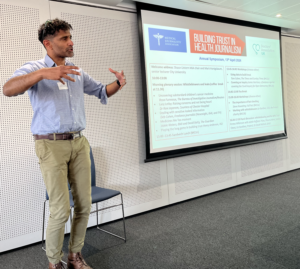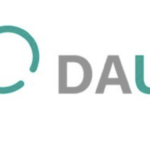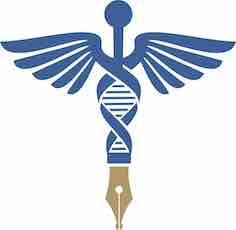Journalists need time to build sources, gain trust and triple-check the evidence when working on sensitive stories, delegates at the 2024 MJA Annual Symposium heard.
This year the focus was on working with whistle-blowers, with a wealth of insights from both the journalist’s and the whistleblowers perspective – and this is a topic we hope to continue to explore with Symposium sponsors Doctors’ Association UK.

Letby whistleblower, Dr Ravi Jayaram
At the morning’s session, Rosa Furneaux, now an investigative journalist at Reuters, got the ball rolling by detailing the many months of work it took to uncover the substandard children’s cancer drugs being shipped to countries around the world.
Protecting sources
The doctors who spoke to her for the story, written during her time at The Bureau of Investigative Journalism, were putting their jobs and reputations at risk — so Rosa had to be incredibly careful about how she built up the case and deciding when to publish.
Dr Ravi Jayaram, consultant paediatrician at the Countess of Chester Hospital spoke about how he and colleagues tried to raise the alarm about Lucy Letby and what happened in the media furore that followed, particularly around Letby’s trial. He talked about building trust by sharing breadcrumbs of information and said the journalists he trusted were those who were respectful in their approach.
Experienced medical investigative journalist Deb Cohen shared her experiences dealing with sensitive leaked information during stories she reported for the BMJ, Newsnight and ITV — and how that work ultimately led to guidelines and processes being changed.
In a joint presentation, Adele Waters from the BMJ and David Batty from the Guardian went through their detailed work uncovering sexual assault in the NHS. Reporters must be given as much time as is needed when carrying out interviews on such sensitive topics and where people have been through trauma, they advised.
Bringing the morning session to a close, Henry Anderson from the HSJ discussed playing the long game in building up contacts and encouraging people to talk. Meeting people face to face wherever possible has proved vital in his reporting, he said.
Stories by numbers
In another jam-packed afternoon session, the symposium heard from Tom Calver, data editor at the Sunday Times about the importance of the stories behind the numbers and from James Harrison, a freelance journalist covering the Covid Inquiry for Open Democracy.

A break for networking and sharing ideas at the 2024 MJA Symposium
Full Fact and the Protect charity also came to talk about their work before a final panel discussion on whistleblowing and the NHS. Among the many issues raised about how whistleblowers and journalists can work better together.
MJA chair Shaun Lintern cautioned that, in his view, leaking information via anonymous Twitter/X accounts could be counter-productive because putting everything out in the public domain deterred experienced journalists covering an issue in more detail.
This year’s event was supported by Doctor’s Association UK (DAUK) and City University Journalism Department. Emma Wilkinson vice-chair of the MJA who put the programme together said she had come away reinvigorated about her own journalism.
Shared wisdom
She said, “The speakers had so much wisdom and experience to share, and it prompted some incredible questions and discussion, as well as ideas for areas ripe for future investigation.
“It has also encouraged me to reflect on my own work and how I approach sensitive stories and conversations.”
Jaimie Kaffash, editor at Pulse, who also took part in the final panel said the whole event had been “incredibly useful”.
“I was a little hesitant because whistleblowing is more an issue in secondary care than general practice. But there were still so many learnings from the event. Just speaking to other journalists, and understanding the challenges and issues they face – and how they overcome them – left me with loads of takeaways to relay back to my team.”
Inspirational
Sarah Lowden, news editor at Doctors.net said it had been a brilliant day. “Lots of great speakers — who gave inspirational talks which got the ideas flowing — and a great opportunity for making some connections in the health journalism world.”

The Symposium was sponsored by Doctors Association UK
Lizzie Toberty, DAUK’s GP lead who attended the event said: “It was a brilliant day, with fascinating presenters and speakers who knew their subjects inside out.
“There was lots of interesting and lively debate and discussion, lots of information to digest and to take away, and lots of networking and new contacts being made.
“Medical journalists play a vital role in communicating the workings of healthcare and medicine, and everything that goes with that, and we at DAUK were really pleased to be able to collaborate with the Medical Journalists’ Association.”



Recent Comments